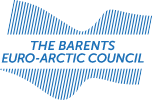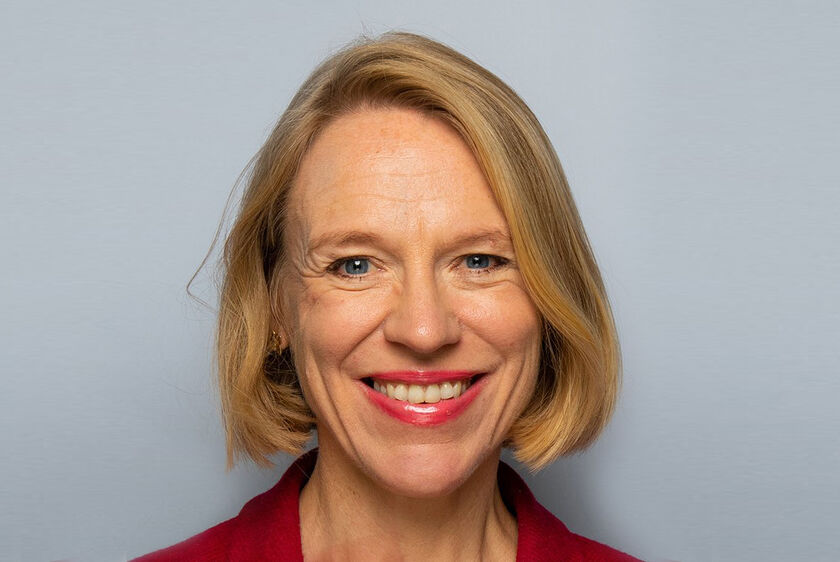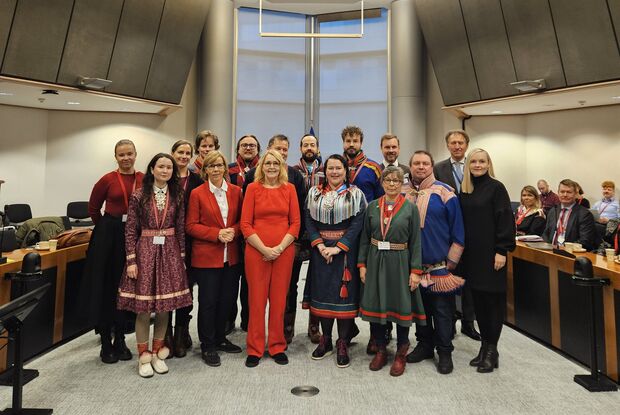– What are the first three things you associate with the Barents region?
The first thing that comes to my mind when I think about the Barents region is the unique, dynamic people-to-people cooperation across our borders. Our everyday contact and exchanges in areas ranging from culture and sport to education and much much more are at the heart of the Barents cooperation and strengthen respect and understanding between the countries in the north.
Secondly, the Barents region is rich in resources. Most importantly in human resources, but also in opportunities for economic growth. Securing sustainable economic development, jobs and attractive communities is key to building a stronger and more resilient Barents region.
Thirdly I think about the importance of the regional partners as key drivers of the Barents cooperation. We greatly value our close cooperation with Västerbotten, the Chair of the Barents Regional Council, with whom we have co-hosted all our events.
– Why do we need the Barents cooperation?
The Barents cooperation has been a cornerstone of regional cooperation in the Arctic for almost 30 years, and has played an important role in promoting peace and stability in the region. These many years of cooperation have demonstrated the benefits of continuous contact and meetings between people across borders. More than anything, the cooperation is about building common understanding, trust, and respect between different cultures.
The geopolitical situation we live in today is complex, which makes dialogue and cooperation between the countries in the north even more important. While we may have differing views on important foreign and security policy issues, we still have a great deal to talk about and we continue to work together on a wide range of matters of common interest in the region – as good neighbours should. The success of the Barents Euro-Arctic Council is the result of long-term commitment and political decisions based on shared interests. We will continue our day-to-day efforts to strengthen and develop this cooperation.
– What is your personal experience of the Barents cooperation? Do you have personal memories relating to the Barents region?
I have visited War Monuments from the Second World War several times, on my previous travels as a Member of Parliament. These visits made great impressions and reminded me of the strong historic relations between the Barents countries. Our countries have played different roles throughout history, but our peoples have a lot in common.
– Cooperation in the Barents region was started in 1993, over 28 years ago. In your opinion, what are the main achievements of the cooperation so far?
Back in the early 1990s, the initiator of the Barents cooperation, Norwegian Foreign Minister Thorvald Stoltenberg, saw the possibility of turning a closed border into a bridge instead of a barrier, and changing an area of confrontation into an area of cooperation. Since the signing of the Kirkenes Declaration in 1993, the member states have remained truly dedicated to strengthening relations between the national and regional levels, fostering mutual understanding, promoting practical people-to-people contacts and encouraging collaboration between professionals in the Barents region. The fact that this dedication and cooperation has continued, and has been more or less unaffected by developments on the broader international arena, bears witness to its success.
It is also positive that the Norwegian chairmanship has achieved greater inclusion of young people in the various areas of the Council’s work, and that the Council has focused greater attention on the need to preserve and strengthen the culture and languages of indigenous peoples in the region. I would like to thank Russia for initiating the practice of biannual Indigenous Peoples’ Summits, which Norway hosted in June this year. Daily contact between our indigenous communities is a core element of the Barents cooperation, and we must continue to develop these networks. It is with this in mind that Norway and Finland are expanding the International Barents Secretariat to include two new advisers on indigenous issues.
Last but not least, it is a great achievement that, despite the many constraints imposed by the COVID-19 pandemic, the regions, working groups, indigenous peoples, young people, experts and project partners have found new and creative ways to work together and keep the cooperation going. This really proves the strength and value of the Barents cooperation.
– What will the Barents cooperation look like in 20 years?
I firmly believe that, 20 years from now, the Barents cooperation will still be seen as a vital platform for regional cooperation between states, regions and the people living in the north. I also believe that there will be more cooperation, not less, as we will have more experience to build on and will develop new ways of cooperating – as we have already seen during the pandemic.
As I see it, the solutions for tomorrow’s Barents region lie in increasing our knowledge about the region, expanding our dialogue, and using our broad experience to think along new lines. It is crucial that we continue to listen to our young people as the cooperation moves forward. The level of engagement, helpful input and targeted insights provided by young people in the Barents region during the Norwegian chairmanship gives good reason to be optimistic about the future.
– How do you see the Barents cooperation in relation to the Arctic cooperation?
Peace, stability, and well-functioning cooperation with our Arctic neighbours is at the top of Norway’s foreign policy agenda. At a time when international cooperation is under pressure, we need strong multilateral structures like the Barents cooperation and the Arctic Council to maintain stability. Dialogue and common efforts are vital if we are to find the best solutions for the Barents and the broader Arctic region. In this context, it will important to to look for synergies with the other multilateral cooperation structures, such as the Arctic Council, the Council of Baltic Sea States, the Nordic Council of Ministers and the Northern Dimension.
The Barents cooperation is unique in that it involves not only dialogue and cooperation between the member states at the national level, but also daily contact and cooperation across borders between regional and local authorities, and the people living the Barents region.
We are working to promote sustainable development for the people living in the Barents region and would like to encourage more people to choose to live in the north. To achieve this, we must ensure that there are attractive communities offering good welfare and health services and quality education at all levels, with innovative businesses and varied employment opportunities. We must ensure sustainable use of natural resources and adaptation to climate change, we must attract experience and expertise in order to build resilient Barents communities, and we must continue to build trust and confidence across borders as is the case in the Barents cooperation.
– In 2020 the COVID-19 pandemic created many challenges for cross-border cooperation. What can be done to reduce the negative impacts of the pandemic in the Barents region?
When Norway took over the chairmanship in October 2019, our main priorities were to strengthen cooperation on health, people-to-people contact and knowledge, and to continue the enhanced focus on youth and indigenous issues. When the pandemic struck we were all faced with a wide range of new challenges. Closed borders, interrupted projects, plans put on hold and conversations suddenly moved to a digital platform. All this posed obstacles to a cooperation built primarily on contact between people. Thanks to the positive attitude of all parties involved, the cooperation has adjusted in innovative ways and has also been strengthened in some areas. Digital events have allowed broader participation from the Barents region and enabled more voices to be heard. This creative engagement should be supported and continued.
The pandemic changed our daily lives and posed new difficulties, especially for many young people. Mental health is becoming an increasingly important issue, and we must devote greater attention to this in the Barents cooperation in the coming years. A healthy population is an essential basis for a sound and prosperous Barents region. During our chairmanship, we have brought together experts to discuss digital tools for providing better health care. If anything, COVID-19 has forced us to think of new digital solutions. New technologies and eHealth will be an important part of future health policies in the Barents region.
– Looking back at an extraordinary challenging period, how would you summarise the Norwegian chairmanship?
Overall, Norway is pleased that we managed to carry out a productive chairmanship despite the unforeseen challenges of the pandemic, not least thanks to our close cooperation with Chair of the Regional Council, Västerbotten and the help of the International Barents Secretariat, as well as the ongoing support of all the Council-members. Cooperation and activities have continued in all the working groups, and we are pleased to have revitalised the working group on education and research. We have organised high-level meetings on health, climate, youth policy, indigenous peoples, transport and infrastructure, and forestry, and this has maintained strong political focus on the cooperation. We have also expanded the dialogue between the national and regional level by arranging all our chairmanship events together with the regional chair Västerbotten.
The Norwegian chairmanship has included young people in its work from the outset, and we are proud to host the first-ever youth summit in the margins of the ministerial meeting. This allows young people to discuss their ideas and concerns directly with decision-makers. Norway also organised the Barents Ministerial Meeting on Health and Social Issues in Oslo in 2019, which was another first. And halfway through our chairmanship period we convened the first high-level Barents meeting that was co-hosted by the national and regional chairs. The discussions there clearly demonstrated that the joint national-regional approach enriches the Barents cooperation and dialogue.
In addition, we have focused on further strengthening the work of the Council through an administrative reform. We are expanding the international Barents secretariat together with incoming chair Finland, and restructuring the working groups so that they are all co-led by the national and regional level. Finally, an important delivery from the Norwegian chairmanship will be the Barents Financial Mechanism. We are also very pleased that the Council now will approve the updated Barents Action Plan on Climate Change, and we thank Finland for its efforts in this important work.
– Norway continued the good work started by the Swedish chairmanship in highlighting the youth perspective in all activities. What was the message the young people conveyed to you?
The people and young people of the Barents region are our most valuable asset. As has been clearly stated by young people in the region all along, listening to them and involving them is key to building a cooperation for the future. It is also key to building a resilient Barents region. We need the input of young people to learn how we can encourage more of them to move to the communities in the north. Norway has maintained close contacts with the Barents Regional Youth Council since we took over the chairmanship, and we are impressed by the Youth Council’s active involvement and insightful input.
One important message is that we must ensure that young people in the region are offered relevant educational and career opportunities and that there are attractive cultural and sports arenas to take part in. We have strong educational, cultural and sports networks in the Barents region that we must continue to support and strengthen. Projects such as Arctic Skills and ICE (Innovate Cool Experience) for vocational training and entrepreneurship, and international arenas like Barents Games, Riddu Riddu and Barents Bird are examples of high-quality, highly valued arenas for young people living in the Barents region.
We are pleased that Finland will continue the strong focus on youth involvement in the Barents cooperation.
– What will be the impact of the Barents Financial Mechanism?
The Barents Financial Mechanism will make it possible to fund more projects and add further substance to our work and cooperation. We must look ahead and plan for new initiatives. I would like to thank our all partners for their positive participation in establishing this financial mechanism.









